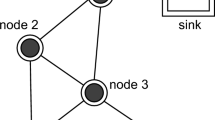Abstract
Wireless sensor networks are a very rapidly emerging class of network structures being utilized in almost all computing environments. Energy consumption is an essential criterion especially with the recent need in conservation of energy and carbon footprint. The proposed research paper investigated the prospects of green computing towards implementation of a hybrid algorithm (NNACOR) based on evolutionary computing model deriving its behaviour from naturally occurring phenomenon for reducing the energy consumed by each node in the mesh topology. The experiments have been conducted in NS2 and compared against the conventional AODC routing protocol, and the observed results indicate a superior performance of the proposed evolutionary model by providing up to a 48% in energy saving as against a 44% energy saving reported in the literature.









Similar content being viewed by others
References
Akyildiz IF, Wang X (2005a) Wireless mesh networks: a survey. Comput Netw J 47(4):445–487
Akyildiz IF, Wang X (2005b) A survey on wireless mesh networks. IEEE Commun Mag 43(9):22–30
Al Hazmi Y, De Meer H, Hummel KA, Meyer H (2011) Energy efficient wireless mesh infrastructures. IEEE Netw 25(2):32–38
Ali Zulfiqar, Shahazad Waseem (2013) Analysis of routing protocols in AD HOC and sensor wireless networks based on swarm intelligence. Int J Netw Commun 3(1):1–11
Amiri E, Keshavarz H, Alizadeh M (2014) Energy efficient routing in wireless sensor networks based on fuzzy ant colony optimization. Int J Distrib Sens Netw 13(4):579–597
Bemmoussat C, Didi F, Feham M (2012) Efficient routing protocol to support QoS in wireless mesh network. Int J Wirel Mob Netw 4(5):89–104
Bianzino A, Chaudet C, Rossi D, Rougier J (2012) A survey of green networking research. IEEE Commun Surv Tutor 14(1):3–20
Capone A, Malandra F, Sanso B (2012) Energy savings in wireless mesh networks in time variable context. Mob Netw Appl 17(2):298–311
Chaudhary D (2010) Bee inspired routing protocols for mobile ad hoc network. J Emerg Technol Web Intell 2(2):86–88
Christensen K, Gunaratne P, Nordman, George B (2004) The next frontier for communication networks: power management. Comput Commun 27(18):1758–1770
Fan Q, Fan J, Li J, Wang X (2012) A multi-hop energy efficient sleeping MAC protocol based on TDMA scheduling for wireless mesh sensor networks. J Netw. https://doi.org/10.4304/jnw.7.9.1355-1361
Gunaratne C, Christensen K (2005) A new predictive power management method for network devices. IEE Electron Lett 41(13):775–777
Kumaravel K, Marimuthu A (2014) An efficient multi path routing algorithm based on hybrid artificial bee colony algorithm for wireless mesh networks. J Theor Appl Inf Technol 68(1):53–62
Liu Y, Yang Z, Ning T (2014) Efficient quality of service support in mobile opportunistic networks. IEEE Trans Veh Technol 63(9):4574–4584
Mamachaoui S, Didi F, Guy Pujolle (2013) A Survey on energy efficiency for wireless mesh networks. Int J Comput Netw Commun 15(2):105–124
Mamachaoui S, Didi F, Senouci Mohamed, Guy Pujolle (2015) Energy efficient management for wireless mesh networks with green routers. Mob Netw Appl 15(2):105–124
Niyato D, Hossain E, Rashid MM, Bhargava VK (2007) Wireless sensor networks with energy harvesting technologies: a game theoretic approach to optimal energy management. IEEE Wirel Commun 14:90–96
Palak (2016) Energy optimization in Ad Hoc networks using ant colony optimization. Int J Res Appl Sci Eng Technol 4(1):79–82
Ting CK, Liao CC (2010) A Memetic algorithm for extending wireless sensor network lifetime. Inf Sci 180:4818–4833
Wang X, Vasilakos AV, Chen M, Liu Y, Kwon TT (2012) A survey of green mobile networks: opportunities and challenges. Mob Netw Appl 17(1):4–20
Zhao Y, Wu L, Li F, Lu S (2012) On maximizing the lifetime of wireless sensor networks using virtual backbone scheduling. Trans Parallel Distrib Process 23:1528–1535
Author information
Authors and Affiliations
Corresponding author
Ethics declarations
Conflict of interest
The authors declare that there is no conflict of interests regarding the publication of this paper.
Additional information
Communicated by V. Loia.
Publisher's Note
Springer Nature remains neutral with regard to jurisdictional claims in published maps and institutional affiliations.
Rights and permissions
About this article
Cite this article
Prakash, B., Jayashri, S. & Prabaharan, G. Hybrid evolutionary algorithm (NNACOR) for energy minimization in a wireless mesh topology towards green computing. Soft Comput 24, 10893–10902 (2020). https://doi.org/10.1007/s00500-019-04592-1
Published:
Issue Date:
DOI: https://doi.org/10.1007/s00500-019-04592-1




